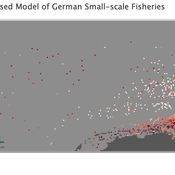Carsten Lemmen
AffiliationsHelmholtz-Zentrum Hereon, Leuphana University of Lüneburg
Professional homepage ORCID more infohttps://orcid.org/0000-0003-3483-6036
GitHub more info
I am a marine environmental scientist by training (U Oldenburg, 2001) with a PhD in atmospheric physics (U Wuppertal, 2005) and a strong modeling focus throughout my career.
Archaological modeling
I have built models (C, C++) for understanding the regional transitions from hunting-gathering subsistence to agropastoral life styles throughout the world. The fundamental principle of these models is to consider aggregate traits of populations, such as the preference for a subsistence style. I applied these models to the European “Wave of Advance”, to the disintegration of the urban Indus civilisation and to the differential emergence of agropastoralism in the Americas versus Europe, but also globally. An interesting outcome of these models are global and reginoally resolved prehistoric CO2 emissions caused by the land use transitions.
Ecosystem modeling
I have built and applied models for understanding the ecological relations and biogeochemical flows through the North Sea ecosystem. Also for this research I apply trait-based models, looking at traits such as vertical positioning or energy allocation. As an outcome, I have, e.g., estimated the biomass of blue mussels in the North Sea and quantified the effect of Offshore Wind Farm biofouling on the sea’s produtivity.
Model coupling
I led the development of the Earth System coupler MOSSCO, leveraging ESMF technologies. I like to rip legacy models apart and reconstruct them with interoperability and reusability by design. I contribute to building the next-generation modular hurricane forecasting system.
Good scientific modeling practices
As a member of the Open Modeling Foundation (OMF), I am an evangelist of good scientific software practices, and educate and publish about improving underlying assumptions, stating clear purposes, keeping models simple and aquiring tools to further good practices.
Peer reviewed Viable North Sea (ViNoS): A NetLogo Agent-based Model of German Small-scale Fisheries
Wolfgang Nikolaus Probst Jieun Seo Jürgen Scheffran Carsten Lemmen Sascha Hokamp Verena Mühlberger Serra Örey | Published Thursday, May 25, 2023 | Last modified Tuesday, December 05, 2023Viable North Sea (ViNoS) is an Agent-based Model of the German North Sea Small-scale Fisheries in a Social-Ecological Systems framework focussing on the adaptive behaviour of fishers facing regulatory, economic, and resource changes. Small-scale fisheries are an important part both of the cultural perception of the German North Sea coast and of its fishing industry. These fisheries are typically family-run operations that use smaller boats and traditional fishing methods to catch a variety of bottom-dwelling species, including plaice, sole, and brown shrimp. Fisheries in the North Sea face area competition with other uses of the sea – long practiced ones like shipping, gas exploration and sand extractions, and currently increasing ones like marine protection and offshore wind farming. German authorities have just released a new maritime spatial plan implementing the need for 30% of protection areas demanded by the United Nations High Seas Treaty and aiming at up to 70 GW of offshore wind power generation by 2045. Fisheries in the North Sea also have to adjust to the northward migration of their established resources following the climate heating of the water. And they have to re-evaluate their economic balance by figuring in the foreseeable rise in oil price and the need for re-investing into their aged fleet.
Under development.
